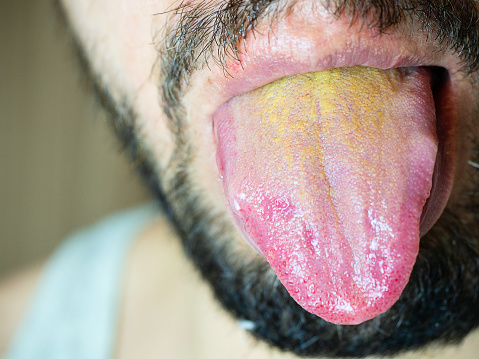Yellow Tongue – Causes and Symptoms

Oral yeast infection causes yellow tongue
A thick yellow coating on the tongue can be caused by a number of factors, including food, bacteria, and dead skin cells. It’s often harmless and will clear up with proper oral hygiene. However, in some cases, it can indicate a more serious condition. People with weakened immune systems and those taking steroid drugs are more susceptible to developing this infection.
A doctor will examine the tongue and ask questions about your diet and lifestyle. They may also recommend additional tests, including blood tests, endoscopy, and imaging tests. Although some cases of yellow tongue are serious, most cases can be treated at home with good oral hygiene. You should brush your tongue thoroughly and rinse your mouth regularly. If your tongue remains yellow even after thorough cleaning, you should avoid food and beverages that contain food coloring.
Medications that contain bismuth can cause yellow tongue
Yellow tongue can be caused by a number of different medications. Antibiotics, blood-thinning drugs, and mouthwash containing chlorhexidine are all known to cause discoloration of the tongue. Bismuth is also known to stain teeth. This condition is not harmful or contagious and is a possible symptom of a more serious disease.
Another possible cause of a yellow tongue is an oral yeast infection. This is common in people with weakened immune systems. However, there are medications that contain bismuth, which can lead to a yellow tongue.
Yeast infection
A yellow tongue can be an indication of an underlying health condition. It is important to seek medical attention if you notice it. This condition is not a serious illness, but it is not harmless. A doctor can diagnose it and prescribe medications to clear up the infection. Besides seeking medical care, you can also try home remedies. Adding more fiber to your diet and taking probiotic supplements can help. You should also practice proper oral hygiene. Brush your teeth at least twice a day and rinse your mouth after every meal. You can also use tongue scrapers to clean your tongue regularly. Also, use an alcohol-free mouthwash to minimize irritation to your tongue.
A yellow tongue can be caused by several health problems, including bacteria, dead skin, and yeast buildup. A thick layer of the yellow coating on the tongue may indicate an underlying condition, such as jaundice (a buildup of bilirubin in the body). A thick, yellow coating on the tongue is often an indicator of an upper respiratory infection or urinary tract infection.
Diabetes
The presence of yellow fur on the tongue is often associated with diabetes. Its prevalence is higher in people with type 2 diabetes. This fur is often accompanied by patterns of phlegm-dampness and blood stasis. One study showed that the proportion of patients with yellow fur on the tongue was higher in people with type 2 diabetes than in healthy controls. However, other features of the tongue were not significantly different in the two groups.
Yellow tongue is caused by the breakdown of red blood cells. The yellow pigment, bilirubin, accumulates abnormally in tissues. This causes the tongue and other parts of the body to appear yellow. In severe cases, the whole skin will be covered with this tint. There are many causes of yellow tongue, but if you notice your tongue turning yellow, seek medical attention as soon as possible. While jaundice is typically harmless, if left untreated, it can indicate a potentially life-threatening condition. Other causes include autoimmune conditions that weaken the immune system and bacterial growth.
Smoking can cause black hairy tongue
Black hairy tongue is a benign condition characterized by elongated filiform papillae that mimic small hairs. The prevalence of this condition is between 0.5% and 11.3%, and it is associated with tobacco use and poor oral hygiene. Although asymptomatic, it can lead to more serious conditions, such as trigeminal neuralgia.
People with black hairy tongue typically smoke. The condition results from buildup of dead skin cells and taste buds on the tongue. These cells accumulate on the tongue and clog the papillae, giving the tongue a hairy appearance. Tobacco and bacteria also contribute to this appearance, making it look like the tongue is covered in black or dark brown hairs. If you’ve ever noticed this condition, it’s important to consult your doctor as it can be caused by several different things.




